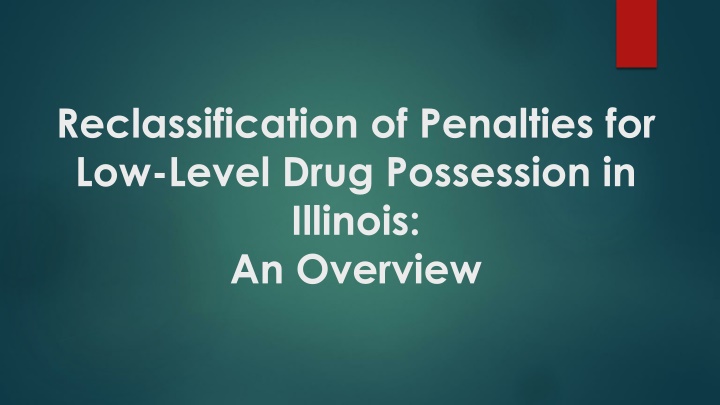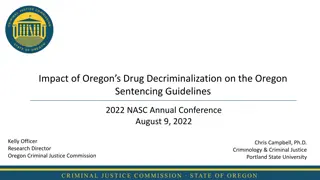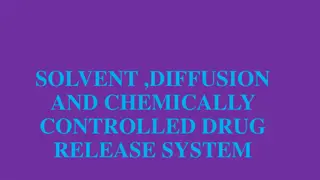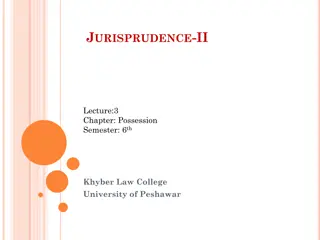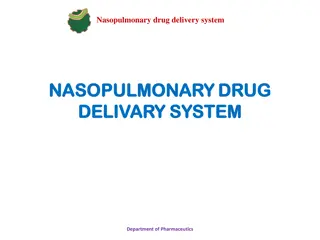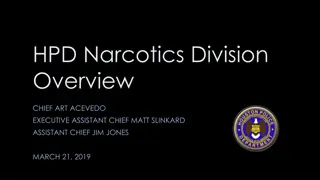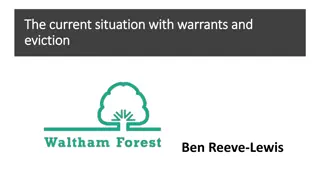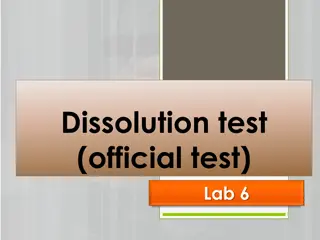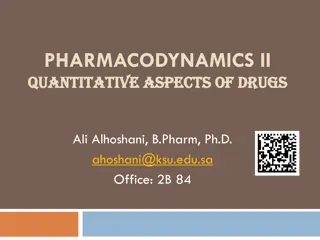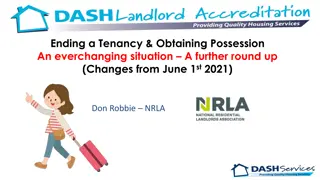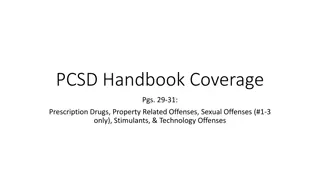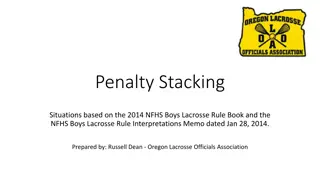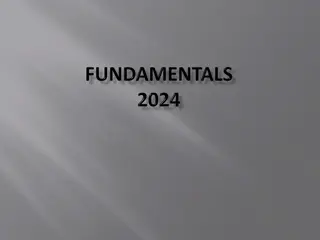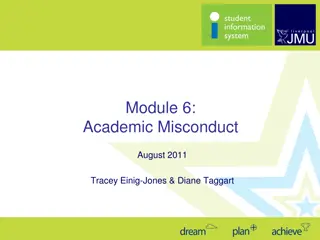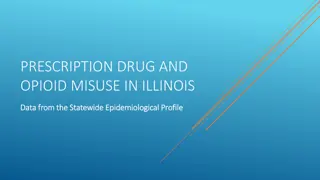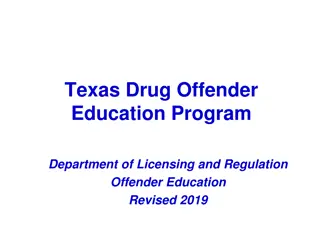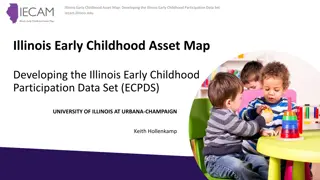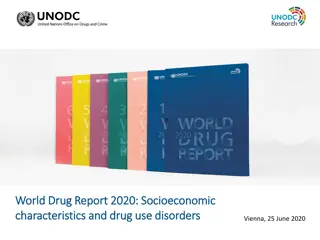Reforming Penalties for Drug Possession in Illinois
Illinois is considering HB 3447 to reclassify penalties for low-level drug possession, shifting from felonies to misdemeanors. This overview explains the differences between felonies and misdemeanors, the impact of the proposed reform on various drugs, and how quantity affects penalties in drug possession cases.
Download Presentation

Please find below an Image/Link to download the presentation.
The content on the website is provided AS IS for your information and personal use only. It may not be sold, licensed, or shared on other websites without obtaining consent from the author.If you encounter any issues during the download, it is possible that the publisher has removed the file from their server.
You are allowed to download the files provided on this website for personal or commercial use, subject to the condition that they are used lawfully. All files are the property of their respective owners.
The content on the website is provided AS IS for your information and personal use only. It may not be sold, licensed, or shared on other websites without obtaining consent from the author.
E N D
Presentation Transcript
Reclassification of Penalties for Low-Level Drug Possession in Illinois: An Overview
What is reclassification? Currently, the possession of any amount of any illegal drug is always classified as a felony in Illinois. HB 3447 is legislation that would reclassify the penalty for small- scale drug possession from a felony to a misdemeanor.
Felony vs. Misdemeanor: Whats the difference? A felony is a crime for which a person may be sentenced to incarceration in the Illinois Department of Corrections (IDOC) for at least 1 year. A person convicted of a felony may also be eligible for a sentence of probation. The penalty for a misdemeanor is usually probation or another form of community supervision. However, a person convicted of a misdemeanor may be sentenced to incarceration in a county jail (not IDOC) for up to 1 year.
What do we mean by drug possession ? HB 3447 would change the penalties for all drugs except cannabis, including: Heroin Cocaine Fentanyl Methamphetamine Opioids (OxyContin, Vicodin, etc.) MDMA/ Ecstasy Hallucinogens (LSD, psilocybin mushrooms, etc.) PCP . . . and every other substance for which possession is currently classified as a felony under Illinois law.
Simple possession vs. possession with intent to deliver : In Illinois, the most commonly charged drug offenses are: Possession of a controlled substance ( PCS or simple possession); and Manufacture, delivery, or possession with intent to deliver a controlled substance. For every drug, the penalty for manufacture/delivery/possession with the intent to deliver is substantially more severe than the penalty for simple possession.
Quantity matters . . . a lot! In Illinois, the penalty for drug possession depends upon the quantity of the substance involved in the offense. The higher the quantity, the more severe the penalty. For the smallest amounts (e.g., 15 grams or less of heroin or cocaine), drug possession is usually classified as a Class 4 felony (1-3 years in prison OR up to 2 years probation). *Exception: Meth possession starts at a Class 3 felony (2-5 years in prison OR up to 2 years probation). However, if the amount exceeds a certain threshold (e.g., 15 grams for heroin or cocaine), the penalty increases to a Class 1 felony (4-15 years in prison OR up to 4 years probation). If the amount exceeds the next-highest threshold (e.g., 100 grams for heroin or cocaine), then the person may receive a prison sentence of 6-30 years. Street drugs are often cut with other substances to increase dealer profit. But the quantity thresholds apply to any substance *containing* any amount of a prohibited drug. Example: Under the law, the penalty for possessing 1 gram of pure cocaine diluted with 20 grams of a non-controlled substance is the same as the penalty for possession of 21 grams of pure cocaine.
Drug possession convictions cause severe and longstanding harm to people. Beyond the negative consequences of incarceration, a past conviction (or even an arrest) for a felony or misdemeanor can have serious consequences for a person, well beyond the completion of their sentence. People with felony convictions are categorically ineligible for certain types of employment, professional licenses, access to public benefits and housing as a matter of law. People with felony convictions also experience a high degree of social stigma, often being denied jobs, housing, education, and other opportunities as a result of records that appear on criminal background checks. While not as damaging as a felony conviction, a misdemeanor record can also have serious collateral consequences for an individual.
How many people are impacted? From 2016-2018, about 20,000 people were convicted of felonies for small-scale drug possession in Illinois. More than 7,500 of those people went to prison.
Who gets incarcerated for drug possession in Illinois? Black people make up a disproportionate percentage of people sent to prison for small-scale simple drug possession offenses:
Who gets incarcerated for drug possession in Illinois?
Who gets incarcerated for drug possession in Illinois? However, meth offenses overwhelmingly impact rural whites:
Who gets incarcerated for drug possession in Illinois? Women represent a relatively small but growing percentage of the Illinois prison population. Of the approximately 2,500 women imprisoned in Illinois, about 80% are mothers, and approximately 65 percent of their children are minors. Women imprisoned in Illinois are more likely to have been convicted of a low- level offense than their male counterparts: 31 percent were convicted of a Class 3 or Class 4 felony, compared to 20 percent of incarcerated men. Imprisoned women are also more likely than men to have been convicted of drug crimes (30 percent vs. 18 percent).
Which Illinois counties send the most people to prison for small-scale drug possession?
Which Illinois counties send the most people to prison for small-scale drug possession?
Trends in incarceration for drug offenses in Illinois: Over the past 20 years, Illinois prison population has decreased by more than 5,000. While the overall percentage of IDOC s population serving time for drug offenses during that time has shrunk from 25% to 14%, the percentage incarcerated for simple drug possession has remained constant at 5%.
Trends in incarceration for drug offenses in Illinois:
Trends in incarceration for drug offenses in Illinois: Illinois prison population peaked on February 9, 2013, when 49,401 people were incarcerated in IDOC. Since then it has declined by 20% (still 7,000+ in excess of its design capacity. According to Loyola University research, a substantial portion (14%) of the recent statewide decrease in Illinois prison population is attributable specifically to fewer arrests for felony drug law violations in three specific police districts in Chicago, just like the tripling and quadrupling of arrests in Chicago in the late 80s tended to be concentrated in very specific neighborhoods.
What is being done to fix this problem? The Reducing Barriers to Recovery initiative (HB 3447) is a bill in the Illinois General Assembly that, if passed into law, would reclassify the penalty for possession of small amounts of drugs from a felony to a Class A misdemeanor, and offer real diversion in the form of behavioral health assessments and access to treatment for people who need it, instead of incarceration.
How would HB 3447 change the law? 1. Sentencing Reform for small-scale simple drug possession: HB 3447 would create new quantity thresholds, below which the penalty for simple drug possession would be reclassified as a Class A misdemeanor rather than a felony. For instance, the bill provides that possession of 5 grams or less of cocaine, or 3 grams or less or heroin, fentanyl or methamphetamine, would be classified as a Class A misdemeanor. Possession of amounts above the new thresholds would remain a felony. The bill would also eliminate possession with intent to deliver (PWID) charges for amounts under the new thresholds. Currently, PWID carries the same penalty as manufacture or delivery of a controlled substance. The bill would not change the penalties for manufacture or delivery of any amount of a controlled substance.
How would HB 3447 change the law? 2. Misdemeanor Diversion Program: At the judge s discretion, a person charged with any misdemeanor offense (other than a violent offense or a crime involving a gun), would be eligible for the program. If the person agrees to comply with the terms of the program, the criminal case would be suspended while they obtain: An evaluation to determine whether they have substance use, mental health, or other social service needs; and If the evaluation indicates that the person has such needs, a comprehensive assessment and service plan. Compliance with the terms of the program would result in dismissal of the charges, and the person would be immediately eligible to petition the court to seal or expunge their record.
How would HB 3447 change the law? 3. Retroactivity: Under HB 3447, a person already serving a sentence could petition the court to reduce their sentence under the new law; and A person who has previously completed a sentence could petition the court to enter an order designating their prior felony conviction as a misdemeanor.
How would HB 3447 change the law? 4. Expungement: HB 3447 would allow records of misdemeanor drug possession convictions to be expunged 5 years after the person completes their sentence. A person who was previously convicted of a felony, and whose conviction was reduced to a misdemeanor at a resentencing hearing, would be eligible for the same relief. Expungement would not be automatic; rather, the individual would be required to petition the court for expungement, and prosecutors would have standing to object.
Who supports reclassifying sentences for low-level drug possession? More than three-quarters of Illinois voters (79%) surveyed in early 2021 support making simple possession of small amounts of drugs a misdemeanor and reducing sentences for all drug offenses. This policy was also recommended by the bipartisan Illinois State Commission on Criminal Justice and Sentencing Reform in its Final Report in 2016.
Who supports reclassifying sentences for low-level drug possession? HB 3447 is supported by a diverse coalition of advocates and stakeholders from across Illinois including public health experts, criminal justice advocates, law enforcement officials, treatment providers, faith leaders, workforce developers, and people directly impacted by the criminalization of addiction: ACLU of Illinois BPI Chicago Buddy s Purpose Cabrini Green Legal Aid Chicago Appleseed Center for Fair Courts Chicago Coalition for the Homeless Chicago Community Bond Fund Chicago Recovery Alliance Chicago Urban League Clergy for a New Drug Policy Communities United Cook County Cook County State s Attorney Communities United Dusty Roads Heartland Alliance Illinois Association for Behavioral Health (IABH) Illinois Justice Project Illinois Religious Action Center of Reform Judaism (RAC-IL) Lake County Sheriff Law Office of the Cook County Public Defender Live4Lali Perfectly Flawed Foundation Revolution Workshop Shriver Center on Poverty Law Students for a Sensible Drug Policy Target Area Development Corporation TASC, Inc. Women s Justice Institute
How can people learn more, or get directly involved in helping to pass HB 3447? For more information, please contact: Ben Ruddell bruddell@aclu-il.org Patrice James patricejames@povertylaw.org Jessica Estrada jessica@communitiesunited.org
